A protein-rich diet is one of the most important elements of our everyday diet. You can consume protein through plant-based or animal-based products. However, if you are a pure vegetarian, you can consume protein with a meal containing Indian vegetarian protein sources. In today’s blog, we’ll discuss different sources of protein for vegetarians.
Why is Protein Important for the Body?
Proteins are made of building blocks, known as amino acids. For cell growth and development, amino acids are essential. Proteins are not only responsible for making the basic structure of our organs, but also our hair, skin, and various other important parts of our body. If there is a lack of protein in your body, it could lose muscle strength, and your muscles become weaker. People, who are recovering from a medical illness must enrich their diet with high protein.
Benefits of a Protein-rich Diet
The following are some benefits of consuming protein-rich food items:
Regulate your hunger
When you consume protein-rich foods, they make you feel full for a longer period of time. It happens because protein can reduce Ghrelin levels, which is a hunger hormone while boosting your Peptide YY levels, the hormone that makes you feel full. As a result, it keeps your hunger level in check.
Strong muscles and bones
Protein is a nutrient that keeps your muscles and bones strong. Proteins have amino acids that repair any type of wear and tear or damaged muscle tissues. A high-protein diet is also helpful in protecting your body externally.
Improves digestion
One of the best benefits of protein is that it helps in improving digestion. When you consume protein every day, it helps in creating enzymes that help break down food and make new cells and chemicals.
Foods with High Protein for Vegetarians
Various foods are rich in protein and some of them are written below:
Lentils
Dal is one of the most common protein foods consumed by people on a very regular basis. Lentils are rich in protein and potassium. According to various studies, lentils can reduce cholesterol levels and diabetes. Lentils are of different types, such as pigeon peas, yellow gram, split beans, moong beans, and so much more. Therefore, you can add lentils to your diet if you are looking for a high protein vegetarian diet for weight loss.
Nuts
Nuts also have protein and are one of the healthiest and oldest protein sources. They also have other important nutrients, such as fibre, Vitamin E, and magnesium. Just like other Indian veg protein sources, nuts are best when people use them as snacks. Furthermore, you can use nuts as a topping for your protein-rich soups, salads, and cereal.
Tofu
Tofu is a lean veg protein made from pressed soybean curds. It is one of the extremely popular plant-based sources of protein for vegans. In addition to this, it is rich in calcium and iron. It is also used as a substitute for curbed meat, and even meat lovers also add tofu to their diets.
Oats
Oats are packed with all the essential protein, fats, and fibre you need. It is easy to make, and that’s why many people choose oats that are high in protein vegetarian meals.
Greek Yogurt
You can eat Greek yogurt, which is considered a high protein diet. Greek yogurt has various health benefits. One of the best ways to eat it is by using chia seeds and fruits as toppings.
All of the above-mentioned food items are high protein foods for non meat eaters. Furthermore, if you are non-vegetarian, then you can include the following foods for protein:
Chicken breast
Egg whites
Chicken liver
Salmon
Tuna
Prawns
Shrimps
Turkey breast
Ground beef
Octopus
Risks of Consuming Too Much Protein
When you consume protein-rich foods in excess, it can lead to some side effects, such as:
Weight gain
Sticking to a high-protein diet can make you fat. Especially, if you are consuming too many calories when trying to consume protein.
Constipation
According to one study, nearly 44% of people reported constipation problems. Protein-rich diets that restrict carbs are usually low in fibre. However, you can get rid of constipation by increasing water and fibre consumption.
Heart Disease
When individuals eat red meat and full-fat dairy foods in excess, then they can lead to heart problems. It could be the result of higher consumption of saturated fat and cholesterol.
Conclusion
It is important to consume adequate protein to boost your overall health. As you are aware of some risk factors associated with too much consumption of protein, it is suggested to take care of how much you are intaking protein. Moreover, get this type of informative blog by subscribing to Personal Care N Heal.
Our Popular Blogs:



